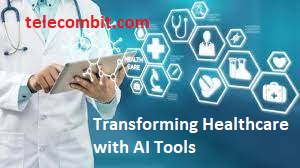How AI Tools Have Revolutionized Human Life
In recent years, the advent of Artificial Intelligence (AI) has brought about a revolutionary change in the way we live our lives. From enhancing productivity and efficiency to improving decision-making processes, AI tools have become an integral part of various industries. This article delves into the remarkable impact of AI tools on human life, exploring the ways in which they have transformed our daily routines, industries, and overall progress.

Transforming Healthcare with AI Tools
Improved Diagnosis and Treatment: AI-powered diagnostic tools have revolutionized the healthcare sector by providing accurate and efficient diagnosis of diseases. Machine learning algorithms can analyze vast amounts of medical data, enabling doctors to detect illnesses early on, recommend appropriate treatment plans, and improve patient outcomes.
Enhancing Precision Medicine: AI tools have contributed to the development of precision medicine, which tailors treatment plans to an individual’s unique genetic makeup and lifestyle. By analyzing large datasets and identifying patterns, AI algorithms help doctors predict diseases, select suitable medications, and personalize therapies, ultimately leading to more effective and targeted healthcare solutions.
Streamlining Administrative Tasks: Administrative tasks, such as appointment scheduling and medical record management, can be time-consuming for healthcare professionals. AI tools, like chatbots and voice recognition systems, simplify these tasks, enabling healthcare providers to focus more on patient care. Through automation and natural language processing, AI streamlines administrative workflows, ensuring efficient operations in medical facilities.

Revolutionizing Transportation and Logistics
Enhancing Traffic Management: AI tools have significantly improved traffic management systems by analyzing real-time data from sensors and cameras. Smart traffic management systems powered by AI algorithms can optimize traffic flow, reduce congestion, and enhance road safety. These tools also enable the development of autonomous vehicles, paving the way for a future with safer and more efficient transportation.
Optimizing Supply Chain Operations: The logistics industry has greatly benefited from AI tools, which optimize supply chain operations by predicting demand, improving route planning, and automating inventory management. Machine learning algorithms can analyze historical data and current trends to forecast future demand accurately. This enables companies to streamline their supply chain, reduce costs, and enhance customer satisfaction.

Advancing Personal Assistants and Smart Devices
Intelligent Virtual Assistants: AI-powered personal assistants, such as Siri, Google Assistant, and Alexa, have become an integral part of our daily lives. These virtual assistants use natural language processing and machine learning algorithms to understand user commands, provide information, and perform various tasks. From setting reminders to controlling smart home devices, AI-driven personal assistants have made life more convenient and efficient.
Smart Home Automation: AI tools have enabled the development of smart home systems, where devices and appliances can be controlled and automated. With the integration of AI, homes can adapt to occupants’ preferences, optimize energy usage, and enhance security. From adjusting lighting and temperature to managing appliances remotely, AI-driven smart homes offer convenience, comfort, and energy efficiency.

Reinventing Finance and Banking
Fraud Detection and Prevention: AI tools have significantly improved fraud detection and prevention in the financial sector. Machine learning algorithms can analyze vast amounts of data, identifying patterns and anomalies that indicate fraudulent activities. By continuously learning and adapting, these AI tools enable financial institutions to safeguard against fraud, protecting both individuals and organizations.
Personalized Financial Services: With the help of AI tools, financial institutions can provide personalized services to their customers. By analyzing customer data, AI algorithms can offer tailored investment advice, suggest suitable financial products, and optimize portfolios. This level of personalization enhances customer satisfaction and fosters a more inclusive and accessible financial ecosystem.

Conclusion
AI tools have ushered in a new era of possibilities, transforming various aspects of human life. From revolutionizing healthcare and transportation and logistics to advancing personal assistants and smart devices, and reinventing finance and banking, the impact of AI on human life is profound. Through improved diagnosis and treatment, AI tools in healthcare have helped medical professionals provide accurate diagnoses and effective treatment plans.





